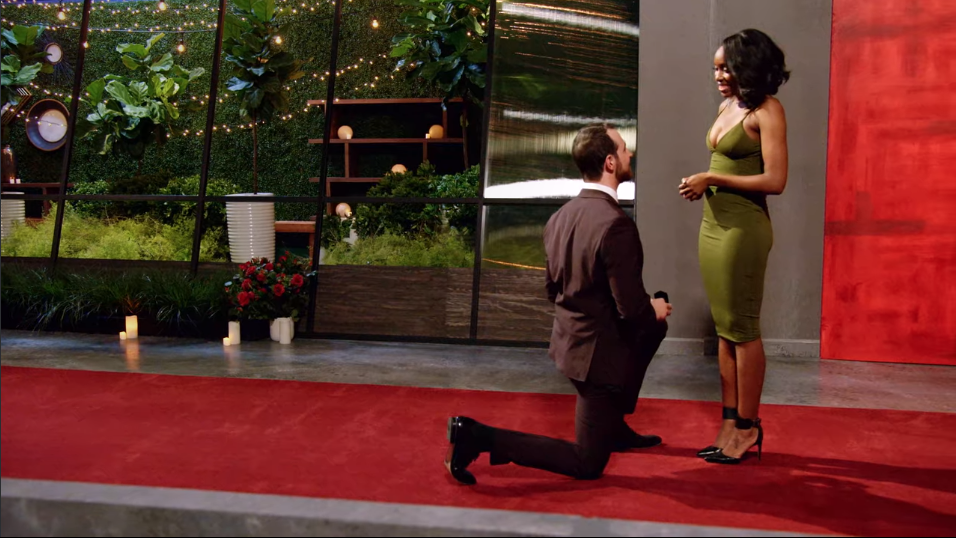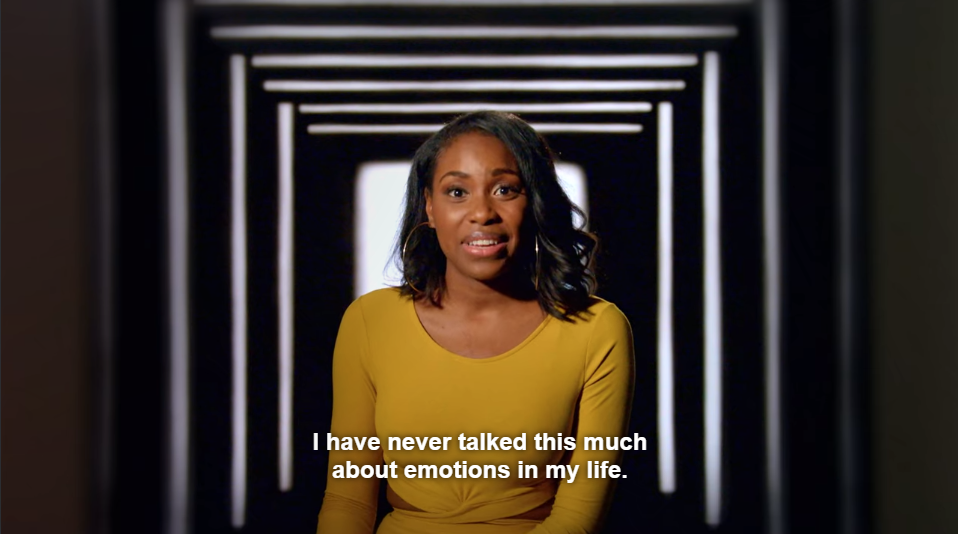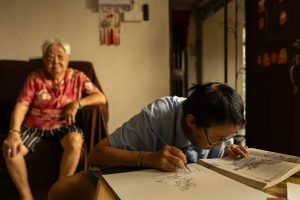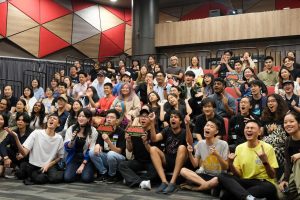The catch: the participants are not allowed to see their dates. They can only talk to each other in rooms known as “pods”. After a maximum of ten days, the men have to decide if they want to propose to any of their blind dates.
That’s the hook of Love Is Blind, the latest hit reality television show from Netflix.
Most of my friends chalk up their obsession to a morbid curiosity to see if the relationships will crash and burn when the couples finally see each other. But I don’t think that’s it. After all, arranged marriages have existed in Asian cultures for centuries.
Instead, what happens in those pods is what fascinates us about Love Is Blind. The show’s producers think the participants are having blind dates. The participants think they are having blind dates. But what they are really having inside is therapy.

Lauren and Cameron, everyone’s favourite pair, always seem to have normal, healthy conversations.
They are upfront about their feelings. Cameron tells Lauren, “I felt the strongest connection with you,” to which Lauren replies, while smiling, “I felt a strong connection with you too.”
They talk about what they value. “Sometimes I just love my family so much,” Lauren says. Cameron replies, “I feel the same way.”
They start crying.
I know the way I’ve put it makes their interaction sound very lame. It’s probably a function of the editing. But they are also expressing a healthy type of vulnerability that makes a person seem more attractive, which, in turn, forges instant connection. Research has shown that displaying vulnerability makes a person seem more desirable in someone else’s eyes.
This is probably why Lauren and Cameron are so universally adored. They are the model adults in the healthy relationships we aspire to emulate. (Discounting the fact they got engaged within one episode of a reality television show.)
But no one watches television for the functioning adults. We root for Lauren and Cameron, but they’re not the main attractions of the show.
We stan a messy couple, sis.
Enter Diamond and Carlton.

“I’ve been taught to be strong, I’ve been taught not to cry,” Diamond says as she cries.
“How do you think I feel?” Carlton replies. “It’s like, ‘boys don’t cry!’ … I have had to learn how to open up, and it’s okay to be sensitive and emotional and vulnerable.”
All these emotional scars make for great television. And like Lauren and Cameron, this pair is being vulnerable. So science says that they should build a strong bond and be attracted to each other too, right?

After they exchange anecdotes about their childhood trauma, Diamond confesses that her feelings towards Carlton have developed precisely because he showed her his vulnerable side: “I really like [it] when he opens up to me. I think it shows that he trusts me, it shows that he is safe with me. It makes me feel like these are the words I’ve been missing from a man.”
Similarly, Carlton implies that he is starting to view Diamond as the woman who can “love him unconditionally” because they were both open about how their parents fucked them up.
Unfortunately for the pair of lovebirds drawn together by their shared suffering, unconditional is exactly what their bond is not.

This armchair psychologist thinks their relationship was fundamentally incompatible because they were not looking for love. Instead, they assumed that happiness would arrive in the form of someone who sees them in all their brokenness, and will hence fix them.
Therefore, when they could talk about themselves freely without feeling that they were being judged by the other party, they mistook it for love.
In other words, their relationship was founded as a client-therapist one. But lovers are not and should not be therapists. Expecting your partner to fix you is the easiest way to fuck up your relationship—as they have shown.

Alas, like most of the RICE team, I have a useless arts degree, so I cannot answer these questions with any ounce of legitimacy. I can only give examples from personal experience.
Healthy disclosure is telling your partner you are sad because your article was shared only 17 times.
Unhealthy dependence is telling your partner you are depressed and expecting them to make you feel better.
Good vulnerability is farting in front of your partner.
Bad vulnerability is cutting in front of your partner.
We have this pernicious myth that love should be unconditional, that our partners should accept all parts of us, warts, fats, third nipple and all, that no secret must stand in its way.
That’s the worst advice you can give to a couple.

I’m going to let Alain de Botton handle this one. He writes in The Book Of Life:
It is ultimately no great sign of kindness to insist on showing someone one’s entire self at all times. Repression, a certain degree of restraint and a dedication to editing one’s pronouncements belongs to love as much as a capacity for explicit confession. The person who cannot tolerate secrets, who in the name of ‘being honest’, shares information so wounding it cannot be forgotten, is no friend of love. Just as no parent tells a child the whole truth, so we should accept the ongoing need to edit our full reality.
So save your complete honesty for your therapist, not your lover. It belongs in the therapist’s room, where a trained medical professional will unconditionally listen to your fears and see your scars with no judgment, will help you get over your childhood trauma, and fix your distorted self-image.

That’s why Love Is Blind is all my friends and I can talk about nowadays. It’s not the sane, healthy conversations that draw our attention. It’s the ones in which people fall to pieces, get jealous, go crazy … thanks to that Frozen wall that magically removes all inhibitions, a la in a therapist’s office.
So what we are really watching, in my opinion, is a reality television show about therapy, not blind dates. The show—at least the first chunk of it, before it degenerates into another boring dating reality series—allows us to live through the therapeutic experience vicariously.
And we are so hooked on it because it’s not love we crave, or want, in our lives. It’s therapy.






